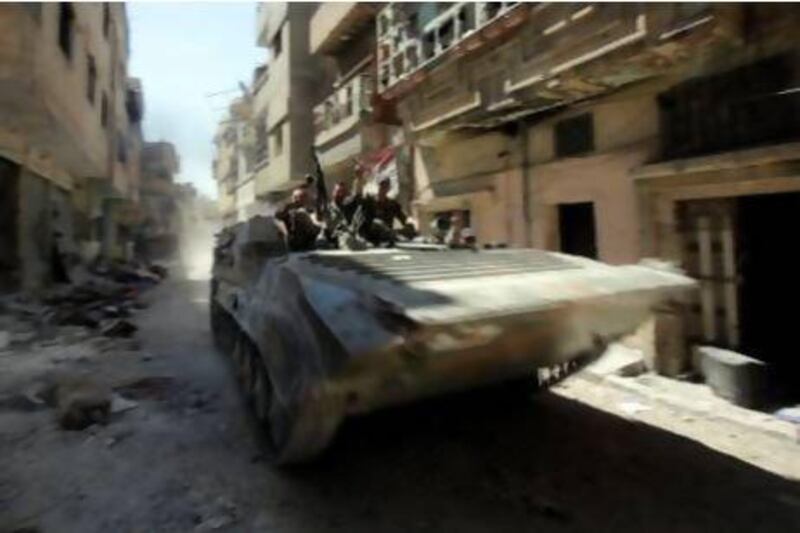BEIRUT // Rocket attacks struck government-held districts in Homs yesterday, setting off explosions at a weapons depot that killed at least 40 people, an opposition group and residents said.
The blasts, which sent a massive fireball into the sky, came as Bashar Al Assad visited a former rebel bastion near Damascus and vowed to defeat the rebels fighting to overthrow his regime.
Although Mr Al Assad's forces have made significant advances against the opposition in recent months, yesterday's events in Homs show that rebels still have the capability to strike back.
The Britain-based Syrian Observatory for Human Rights, which closely monitors the fighting in Syria, said 40 people were killed and 120 were wounded - some critically - when rockets struck the government arms depot
The explosions occurred in the south-eastern district of Wadi Al Dhahab, which the army has taken over, said the Observatory.
The blasts caused widespread damage and panic among residents, many of whom are supporters of Mr Al Assad.
"Rockets were falling on the area ... when the arms depot began to explode but we don't know if the rockets triggered the blasts," said a resident.
Another resident said the explosions were so strong they cracked the walls of some buildings. Thick smoke and dust could be seen from a distance as explosions shook the ground.
A video posted online by activists showed a huge ball of fire over Homs neighbourhoods.
Mr Al Assad said yesterday that he was confident of victory against rebels in the civil war that has killed more than 100,000 people and sent nearly two million fleeing abroad.
Insurgents have seized large swathes of territory, but Mr Al Assad's forces have staged a counter-offensive in recent weeks, pushing them back from around the capital Damascus and retaking several towns near the border with Lebanon.
"If we were not sure that we were going to win in Syria, we would not have the ability to resist and the ability to continue fighting for more than two years against the enemy," the state news agency Sana quoted Mr Al Assad as saying.
Mr Al Assad has framed the revolt against four decades of his family's rule as a foreign-backed conspiracy fought by "terrorists". When pro-democracy protests started in March 2011, a military crackdown eventually led to an armed insurrection.
In a statement published in the official army magazine to mark the 68th anniversary of the Syrian army's creation, Mr Al Assad said soldiers had shown "courage in the face of terrorism ... and the fiercest barbaric war in modern history".
State television said yesterday that Mr Al Assad visited the town of Daraya, south-west of Damascus, to meet members of the security forces.
Regime forces targeted Daraya with artillery after rebels moved into the area last year. The army has since been able to retake parts of the town but at the expense of widespread material damage and many civilian casualties, according to residents.
UN investigators say Mr Al Assad's forces have carried out war crimes including unlawful killing, torture, sexual violence, indiscriminate attacks and pillaging in what appears to be a state-directed policy. They say rebels have also committed war crimes, including executions, but on a lesser scale.
UN inspectors are preparing to travel to Syria within days to investigate claims of chemical weapons use in the country's civil war after the Syrian government granted access to three sites, the United Nations said yesterday. "The team will depart for Syria as soon as practical and is preparing to depart within days," UN spokesman Martin Nesirky told reporters. The United Nations has received 13 reports of chemical weapons attacks. The Syrian government and the opposition both deny using such weapons. The UN inquiry will only try to establish if chemical weapons were used, not who used them.
* Associated Press and Reuters





